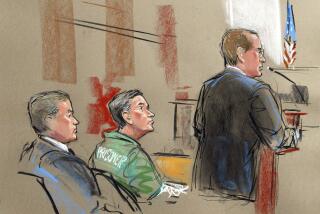Soviet Atom Spy Klaus Fuchs Dies : Physicist, 76, Provided Moscow With Secrets of A-Bomb
- Share via
BONN — Klaus Fuchs, the physicist who passed Western nuclear secrets to the Soviet Union, died Thursday at the age of 76, the East German news agency ADN reported. It gave no details of his death.
In 1950, Fuchs was tried and sentenced to prison in Britain for giving the Soviets secrets on the construction of atomic weapons. According to Western specialists, the information Fuchs provided may have speeded up the construction of a Soviet atomic bomb by years, hastening the country’s rise to superpower status.
Fuchs, a German Communist, fled his native country for Britain in 1934. He was expelled to East Germany in 1959 after being released from a British prison.
Fuchs’ testimony at his trial--conducted mostly in secret--led to the arrest of other spies, including Ethel and Julius Rosenberg, who were executed in the United States in 1953.
Opposed Nazis
Fuchs was born in a suburb of Frankfurt, where his father was a professor of theology and a Quaker. The father opposed the Nazi regime and was sent to a concentration camp after the Nazis came to power in 1933.
Fuchs joined the German Communist Party in 1930, and in 1934, he was forced to leave Germany for England, where he continued his scientific studies, graduating from Edinburgh University. In 1940, after the outbreak of World War II, he was sent to Canada and interned as a German national.
However, he was soon allowed to return to Britain--for advanced study at Glasgow University--and he became a British subject. In 1942, he was offered a position as a nuclear research assistant, his Communist past apparently unsuspected.
Later, in his confession, he said that when he learned the nature of his secret work, he informed the Soviets in order that they might share in what he learned.
In December, 1943, Fuchs was sent to the United States as a member of Britain’s Atomic Energy Commission. He remained there until 1946, working on the development of the first atomic bomb at Los Alamos, N.M.
When he returned to Britain, he was appointed deputy scientific director of the British Atomic Energy Research Institute at Harwell, near Oxford, a position he held until 1950.
Admitted Passing Secrets
By then, British and American security authorities realized that atomic secrets were being leaked to the Soviets. In time, Fuchs was identified as the source. He was questioned and admitted to having passed secrets to the Soviets for several years.
Fuchs’ testimony soured British-U.S. scientific relations. For nine years thereafter, the Americans, charging the British with lax security, shared no atomic information with them. The Fuchs case also bolstered Sen. Joseph McCarthy’s charges that Soviet sympathizers permeated the American government.
A British court sentenced Fuchs to 14 years in prison, but he was released after serving nine. In East Germany, he married a fellow Communist, Greta Keilson, whom he had met in the 1930s, and took over as director of East Germany’s nuclear research center near Dresden. He was admitted to the Central Committee of the Socialist Union, East Germany’s Communist party.
He retired in 1979. East German leader Erich Honecker called him “one of the first scientists to recognize clearly the role and responsibility of the scientist in the atomic age.”
Fuchs’ life became the subject of books, plays and films, and he insisted that he never had any regrets about his espionage. He said his spying was justified because he considered the Soviet system superior to Western capitalism.
In one of his last interviews, the slight, bespectacled, balding scientist declared that communism was the better system for scientists because it allowed them to translate their sense of responsibility into practice.
In its report of his death, the East German news agency made no mention of Fuchs’ espionage activities. It said he had devoted his life to the working-class movement and was “a true friend of the Soviet Union.”
More to Read
Sign up for Essential California
The most important California stories and recommendations in your inbox every morning.
You may occasionally receive promotional content from the Los Angeles Times.













